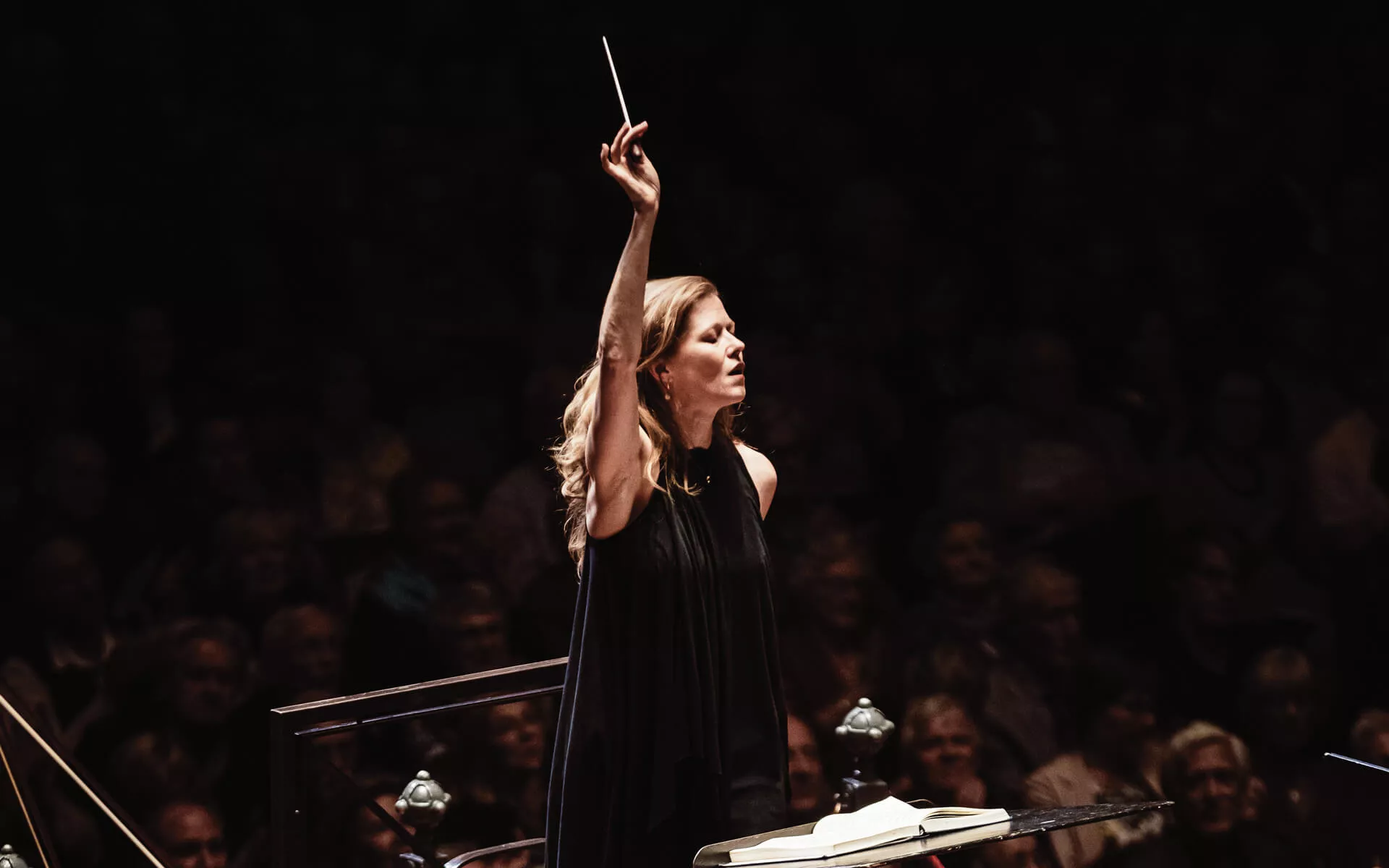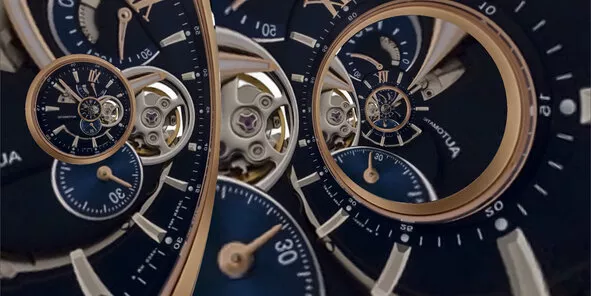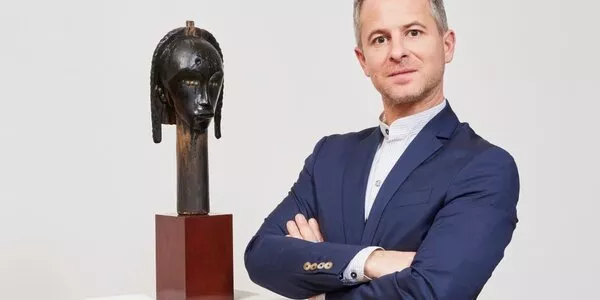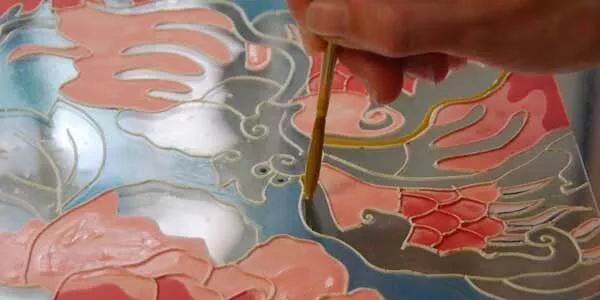
Barbara Hannigan, mentor with a passion
Bringing together professionals who have had an impact on her career, Barbara Hannigan now wants to share what she has learned. EQ helps singers and instrumentalists train by familiarising them with professional situations. EQ challenges them and encourages them to develop their skills in order to become more complete artists. Mécénat Musical Societe Generale, after being committed for more than 30 years to the professional integration of young musicians in France, decided in June 2019 to partner with the Equilibrium project.
Your commitment to young people goes back to your childhood and a specific teacher... Please tell us about this.
Barbara Hannigan: I've talked about Miss MacEwen a lot! I was six when she came to our school to teach music. She came from a family of musicians: her two parents had studied at the Juilliard School of Music (one of the most renowned international music schools). You have to imagine our tiny village in Canada: to get home you even had to take a dirt road. The school was at the other end of the track! Having a teacher of this calibre was an extraordinary gift, the importance of which I can only now understand. Her musical skills were great, but even more so was her passion, her joy in making music. Miss MacEwen has always been an immense source of inspiration. Anyone can teach you rhythm, harmony and musical theory, but someone who can pass on the passion is... truly precious. I understood with her that a mentor, a teacher, can inspire us not only by what they have learned from others, but by how they teach; how they, themselves, in turn, interact with others.
“Anyone can teach you rhythm, harmony and musical theory, but someone who can pass on the passion is... truly precious.”
How did she interact?
B.H.: Her way of teaching was beautiful. She always placed me among the children who had trouble singing. I was very comfortable with this, and Miss MacEwen knew that she could rely on me. She didn't isolate them. She put them at the heart of the group. Of course, she never explained that to me. I certainly never found it unpleasant. I stayed there, naturally. It made me stronger. I knew I could help others. That's another nice lesson I owe her: by lifting up others, we lift up ourselves.
Did this experience lead you to become a conductor, a leader?
B.H.: Certainly not a conductor: I didn't think about it until I was 30! But a leader, yes.
I wouldn't have used that word, but the idea of combining forces comes from that time. In a remote village, with snow regularly affecting transport, one cannot survive without one's neighbours. The sense of community was very strong. In school, it was the same: the one who was good in math, sport, music and so on would always help the others.
You have given several masterclasses. Why create a specific program?
B.H.: I wanted to find a more effective way to help, to convey what I learned from classical music, its economy, and how to build a career. While they are students, future professional musicians have access to numerous training programs, such as masterclasses. But once graduated... there's really nothing. And, I have noticed, this moment of transition is delicate in any sector: medical, banking, artistic... There has always been a void in the help offered to young musicians starting off. That's why I created Equilibrium.
What is the added value of Equilibrium?
B.H.: In my career, I received less help from my fellow singers than from other musicians: composers such as Pierre Bouleez, instrumentalists from the orchestras with which I sang, and conductors such as Sir Simon Rattle. Now, with 25 years of experience, I can solicit the help of the greats of contemporary classical music. I asked soprano Natalie Dessay, conductor Daniel Harding and director Kasper Holten to speak with the young people of Equilibrium. We have all experienced difficult times that undermine our confidence. And young people need to learn to manage the difficulties of a profession, a career, keeping their motivation, and their passion, intact.
Why did you choose the word “Equilibrium”?
B.H.: “Equilibrium” is the perfect word to describe a personal career at multiple levels. Balance is actually a state of permanent change, which must always remain... balanced, in equilibrium. It doesn't matter if you have 30% on one side and 70% on the other, as long as the balance remains. The idea is not to always have “50/50”. Permanent change is the daily life of the singer. A violinist will have to adapt their violin if the weather is wet or dry. For the singer, it's worse: they wake up in the morning and their instrument has changed slightly. It can be quite a challenge! But Equilibrium also means, for me, how to be a generous, attentive colleague who takes care of themselves and others? How can you stay honest in your artistic approach and still keep the fridge full? I'm privileged to be able to choose which projects I undertake. But the young people?
Is being a woman also an issue?
B.H.: Of course. All singers have to make choices, but female singers much more than others. Do I want a career or stay at home and bring up my kids? When they are old enough to go to school, we can no longer take them on tour with us: so a balance also has to be found between domestic life and artistic wishes. It's an endless questioning! I learn a lot from young singers. In 2019, they face a much harder situation than I experienced when I left school.
What's changed?
B.H.: The Internet! Social networks! When I was a student in the late 1990s, we had, at best, a cell phone and an e-mail. Artist sites didn't exist yet or barely. Concerts were broadcast on the radio, but very rarely filmed... Today, young people can't afford to make any mistakes. Facebook and Instagram require an artist to be constantly promoted and aware of what they are doing. You can't find a quiet moment or just have a go at Gustav Mahler's Fourth Symphony without someone keeping track of it. A documentary was made on EQ, Taking Risks. The film crew had cameras filming continuously, during the auditions, the debates on the choice of participants, the mentoring, the participations of Natalie Dessay and Daniel Harding. I wanted to show the pressure that singers face every day.
“Facebook and Instagram require an artist to be constantly promoted and aware of what they are doing.”
For EQ, you have a sports coach and a yoga teacher with you. It's quite unusual, isn't it?
B.H.: Yoga is very relevant for a singer, as it focuses on breathing and stretching. The participation of Jackie Reardon, a sports coach, was born out of inspirations I had while reading his book (Mindset — A mental guide for sport). Jackie analyses the influence of mental discipline on performance. Lyrical art is based not only on vocal technique, but also on a mental discipline: to sing well, you have to know how to mobilise your technique, regardless of the level of pressure you face. We need to train to master our attention, our concentration. I have experienced it myself.
Do you like auditions?
B.H.: Yes! For artists, auditions are most often a painful moment, horrible even! To select the 20 young people from each Equilibrium intake, I wanted to propose something else. They sing or play in front of several professionals with whom they can exchange and learn. This is a huge job, because we recruit from 39 countries, we receive about 350 applications and we get to see 125 musicians in audition.
Mécénat Musical Societe Generale, patron of Equilibrium
For more than 30 years, the long-standing dedication and commitment of Mécénat Musical Société Générale has made it a top patron of classical music in France.
Its commitment to young musicians has been reflected in partnerships since 1988 with the two most prestigious schools of classical music education in the country: the National Conservatories of Music of Paris and Lyon. The association provides assistance to their students' personal projects: purchase of instruments, touring abroad, participation in contests, etc. To support the growth of the most promising instrumentalists, Mécénat Musical Société Générale has also committed itself to creating a collection of ancient and contemporary instruments.
Since 2017, the association has supported la Maîtrise Populaire of Opéra-Comique, which trains young singers aged from eight to twenty-three years old. Working in one of the oldest concert houses in France, this troupe is trained in singing, stamina, rehearsal, staging and even stage fright.
Equilibrium (EQ) takes over with these initiatives as the young graduate faces the important choices ahead. Supported by Mécénat Musical Société Générale, EQ is more than ever an embodiment of the Group's signature: “The Future is You.”





